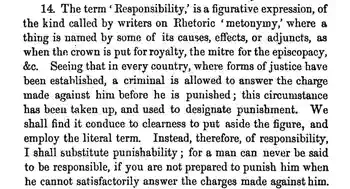In a spectacularly short time, the concept of responsibility has risen from obscurity to prominence: Coined as a political concept in the debates surrounding the democratic revolutions in America and France, it was used to rethink the relation between the government and the people or the government and the parliament. These beginnings as well as the subsequent developments of the concept—its individualization in ethics (Max Weber), its usage in Germany to cope with an unbearable past after World War II (Karl Jasper), its connection to sustainability (Hans Jonas) and its newest offspring in international relations, the “responsibility to protect”, to name only a few stages—are the first set of core themes in this seminar.
The second set is comprised of critical reflections on the concept of political responsibility and on the methods used to understand its history. Whether history of ideas, conceptual history or genealogy, each way of writing the history of “political responsibility” has its own presuppositions which influence our understanding of that concept. Furthermore, “responsibility” and “political responsibility” are self-evident concepts which we frequently use but hardly ever question. So how can we get enough distance from them to not project our understanding onto older conceptions of responsibility?
Allgemeine Literatur zur Vorbereitung
Nietzsche, Friedrich (1997 [1887]): On the Genealogy of Morals. Translated by Carol Diethe. Ed. by Keith Ansell-Pearson. Cambridge: Cambridge University Press.
Skinner, Quentin (2002 [1969]): Meaning and Understanding in the History of Ideas. In: Visions of Politics, vol. 1: Regarding Method. Cambridge/New York: Cambridge University Press, 57–89.
Voraussetzungen
There are no special requirements.
Leistungsnachweise
Examination: Essay of up to 5,000 words (100%).
Pass/Fail Examination: Students must either write two response papers to two different texts discussed in the course or give a short oral presentation to one of the texts.
